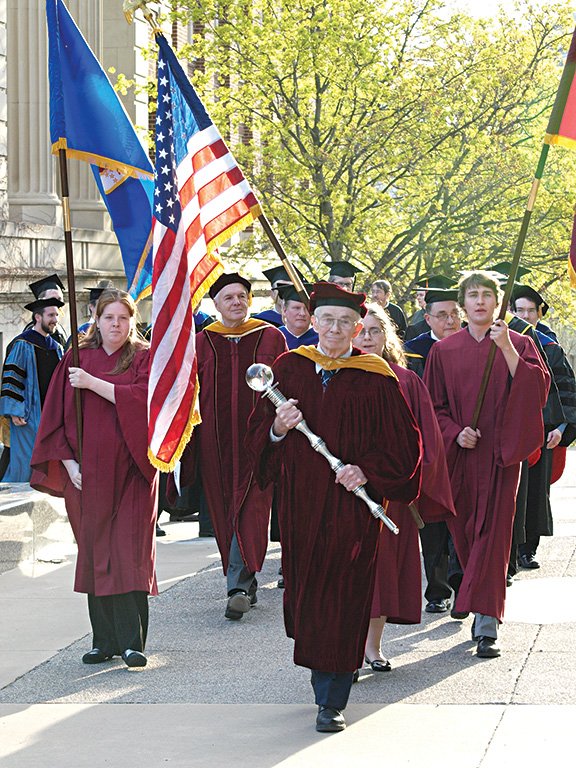92 and counting

* Editor’s Note: Professor Emeritus Wayland Noland died on October 4, 2022 at 95; read about his legacy at the University of Minnesota on the Department of Chemistry website.
Faculty emeritus finds joy in supporting students through philanthropy
October 25, 2018
For many people, retirement means flying off to faraway lands and never stepping foot in the office again. Wayland Noland isn’t like most people.
The 92-year-old professor emeritus of chemistry still spends the bulk of his days in his Smith Hall office. If he’s not reading or writing a paper, he’s consulting with the 9 or 10 researchers in his four labs on the Twin Cities campus.
In fact, since he officially retired in 2016, Noland has “been working harder than I ever have before,” he said. “And the motivation is to get a bunch of papers published on research that we’ve already done or are doing.”
But isn’t retirement about relaxing and enjoying the fruits of one’s labor?
In Noland’s case, 64 years with the same employer. His reply: “My ambition of a happy retirement is not traveling around the world to see something that I’ve never seen before."
"I would rather spend my time doing things that I hope will be useful to people who survive me,” Noland said.
And one of those things, he confirmed, is donating money to the College of Science and Engineering.
Noland has six endowed funds that support both undergraduate and graduate students. He made his first gift to the University of Minnesota in 1984. He endowed his first fund, the Wayland E. Noland Fellowship in Organic Chemistry, in 2000 and started giving to the college fund in 2004.
The following are edited excerpts from a conversation with him.
You’ve been around a while, what’s changed?
A lot. But one thing stands out: The quality of the entering student at the University has gone up steadily—so that the average student when I started here might have been a below-average student now—because we’ve been successful in recruiting more top-quality students in recent years.
What kind of student were you?
When I was at the University of Wisconsin, I graduated with a cumulative GPA of 4.0. I really lucked out.
So, rival state to Minneapolis…
I grew up in Madison, but I came to the University of Minnesota because they gave me a job. Minneapolis was like a big version of Madison—a green, pretty nice city with lakes.
Did you get financial help in college?
I did. A major help at the start was veteran’s benefits. I was drafted near the end of World War II and served for 11 months. I was trained as a medic and surgical technician in preparation for the invasion of Japan. But I never went over because of the atomic bomb.
Are you helping students today because you got a great education?
That, and the ability to support undergraduate and graduate student research, which is an important aspect of their education. I’m still involved in research because I want to find out answers to questions that aren’t solved yet; to make compounds that are new in the laboratory and, hopefully, find some that have some use. In my case, most probably that’s potential pharmaceutical compounds. There’s a saying I’ve heard: ‘Out of 10,000 compounds, you may find one that may prove to be a useful drug.’ Well, I haven’t made 10,000 but I’ve probably made seven or eight thousand new compounds—and I haven’t hit the jackpot.
How do you decide to give money?
The field of philanthropy is very large. You have people who give a little bit of money to a whole lot of different things, on the one extreme, and you have people who give a large amount of money to a few things. I have probably been within the 10 percent on the latter side. There are so many things that deserve financial support. You have to decide how you’re going to be guided. I made the decision to support education primarily at the schools I have attended, including scientific causes to a considerable extent.
Any advice for someone considering a gift to CSE?
You can’t take your money with you. So then the question is: Where can you do the most good before and after you’re gone?
If you’d like to support students at the University of Minnesota College of Science and Engineering, visit our CSE Giving website.
From his 2018-19 scholarship recipients...
“This fall, I’m applying to Ph.D. programs while still taking challenging courses, conducting research, and being involved in student groups. Professor Noland’s scholarship allows me to dedicate more time to these endeavors and prepare for my future.”
—Kathleen Wang, Class of 2019, Wayland E. Noland Award for Academic Excellence in Chemistry
"Professor Noland's generosity has helped me to offset the cost of my education so that I can spend more time getting experience in the research lab.”
—Annika Page, Class of 2019, Wayland E. Noland Award for Academic Excellence in Chemistry
